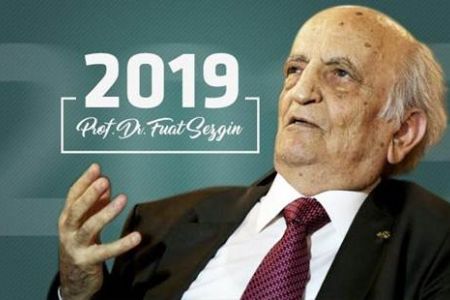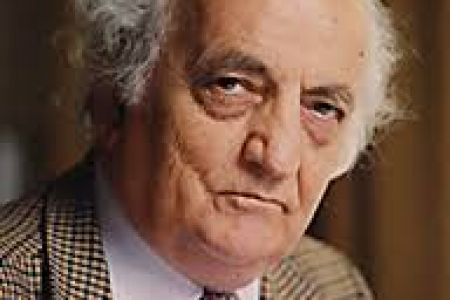2019 is the Professor Fuat Sezgin Year
Turkey declared 2019 as the year of Fuat Sezgin, a world-renowned late Turkish historian, under a circular published in the Official Gazette.
Prof. Dr. Fuat Sezgin was born in Bitlis on 24 October 1924. He graduated the middle and high schools in Erzurum and then came to Istanbul to study mathematics and become an engineer according to his first plan. On the advice of a relative, Sezgin attended a seminar in the Institute for the Oriental Studies at Istanbul University that was given by the German orientalist Hellmut Ritter, who was one of the most renowned specialists in his field. This caused Fuat Sezgin to change his plans radically. Under the influence of what Hellmut Ritter talked about, the following day Fuat Sezgin went to the Institute to enroll on the courses. Neither the expired deadline for enrollment on the courses nor Hellmut Ritter’s warnings regarding the difficulties of the field dissuaded him the decision.
When the university education was suspended because of the advance of the German army as far as Bulgaria in 1943, Ritter recommended his students to spend this long interval of time profitably and learn Arabic. Fuat Sezgin decided to compare Taberi’s exegesis of Qur’an with the translations of the Qur’an, and for 17 hours a day during six months he studied Arabic to understand the exegesis written in a difficult language. At the end of the six months he was reading the Arabic of the Taberi’s exegesis easily as if he was reading a newspaper. When Hellmut Ritter put the Ihya Ulum al-Din by al-Gazzali in front of Fuat Sezgin to read, he was very happy when his student succeeded in reading this easily. He suggested to Fuat Sezgin, who is very capable in learning languages, that he learns five languages simultaneously and start to learn a new language every year. Sezgin sustained this fast pace of work into his old age.
In 1947, after Sezgin finished his thesis about the development of the science of al-Badii, under the supervision of Hellmut Ritter, he prepared a second thesis regarding the philological exegesis in Abu Ubayda Ma’mar ibn al-Musanna’s Majaz al-Qur’an. While Fuat Sezgin was working on the Majaz al-Qur’an for his doctoral thesis, he noticed that some places in Majaz al-Qur’an were also found in the hadith book by al-Bukhari. al-Bukhari’s use of written sources proved that the claims of the previous academics regarding hadith scholars just using oral traditions were wrong. Fuat Sezgin published in 1956 his dissertation titled ‘‘Studies in the Written Sources of al-Bukhari’’.
When Fuat Sezgin saw his name on a list of the names of the 147 academics to be taken away universities which had been and prepared by the new government following the military coup of 1960, he was forced to continue his studies outside Turkey. Leaving his homeland in desperation, he continued to teach and research at Frankfurt University. In 1965, he wrote his second doctoral dissertation on Jabir ibn Hayyan in the Institut für Geschichte der Naturwissenschaften at Frankfurt University and one year later received the title of professor.
In the same year he married to Ursula Sezgin, who is an orientalist like him. In 1970, their daughter Hilal was born. In 1967, he published the first volume of Geschichte des Arabischen Schrifttums which, the beginning of the history of science until today, is the most comprehensive book in its field. He is writing these days the 18th volume of his multi-volume book. Some subjects in different volumes of this comprehensive book are as follows: Qur’anic Sciences, sciences of hadith, history, Islamic law, dogmatics, sufism, poetry, medicine, pharmacology, zoology, veterinary, alchemy, astrology, meteorology and relevant topics, grammar, mathematical geography and cartography in Islam.
A commitee consisting of more than 10 academics interested in the improvement of Geschichte der Arabischen Literatur by Carl Brockelmann understood the importance of GAS and, by deciding to transfer the improvement of GAL to Fuat Sezgin, it abolished itself. In the same year, when Fuat Sezgin sent a copy of the first volume to learn his teacher’s opinions a specialist’s perspective, the experienced orientalist celebrated Fuat Sezgin by saying ‘‘no-one has ever written such a work before and will never write in the future.’’
In 1978, Fuat Sezgin received the King Faysal International Prize for Islamic Studies. When this award was presented to him, he used it to found the Institut für Geschichte der Arabisch-Islamischen Wissenschaften, affiliated to Goethe University in Frankfurt, and he is still the head of the institute.
The German physicist Eilhard Wiedemann, wishing to introduce the scientific instruments in Islam to people as models extracted the books, started to make the models of these scientific instruments in 1900. In nearly 30 years of his life was able to make models of five instruments until 1928. Prof. Dr. Fuat Sezgin started to work wondering ‘‘Can I make 30 instruments? Can I fill a room, even though not a museum?’’ In fact he has been able to make over 800 instruments at the Museum of History of Islamic Science he founded in Frankfurt. At the museum, are exhibited over 800 specimens of the inventions and instruments of Muslim scientists based on the written sources which were made by Fuat Sezgin. In the same building there exists the History of Sciences Library of 45.000 books which he founded, carefully chosen and in spite of all difficulties. This library, which contains some books that are unique copies, is a reference library.
In 2008, a second museum, containing nearly 700 objects, was founded by the extraordinary efforts of Fuat Sezgin. All these objects were gained as a gift Fuat Sezgin and are displayed in the building inside Gülhane Park. These museums present comprehensively the inventions and discoveries which are Muslim scientist’s gift to humanity, the evolution of the history of science in its different disciplines, and innovations in their field. The objects are exhibited attractively and in a systematic order, and they cover the fields of astronomy, geography, navigation, timekeeping, geometry, optics, medicine, chemistry, mineralogy, physics, architecture, instruments and military technology. They show the great inventions and discoveries of the Islamic sciences and present to the visitors the fact that those inventions and discoveries in different ways reached Europe and were received and assimilated there. Thus in realistic and objective ways, far away the feelings and prejudices, the museum demonstrates that the history of sciences is a unified whole.
Prof. Dr. Fuat Sezgin wrote a five-volume work of 1.121 pages entitled Science and Technology in Islam which introduces the instruments in these museums. Such a comprehensive work could for the first time be written and was translated into four languages; Turkish, English, German and French.
In 2010, The Prof. Dr. Fuat Sezgin Research Foundation for History of Science in Islam was established with the aim of supporting the activities of the Istanbul Museum for the History of Science and Technology in Islam and The Prof. Dr. Fuat Sezgin Institute for the History of Islamic Science affiliated to the Fatih Sultan Mehmet Vakıf University. The Prof. Dr. Fuat Sezgin Research Foundation for the History of Islamic Science gives a scholarship of 1.000 TL. per month to the undergraduate students and as well as 1.400 TL. per month to the master of arts students at the Institute. The revenue achieved through the sales of Fuat Sezgin’s books published by the foundation is assigned to the student scholarships.
Prof. Dr. Fuat Sezgin, who is a member of a variety of international academies, was considered worthy a number of important awards and medals. Some of these are The Academy of the Arabic Language in Cairo, The Academy of the Arabic Language in Damascus, The Academy of the Kingdom of Morocco, The Academy of the Arabic Language in Baghdad and honorary membership in The Turkish Academy of Sciences. He has the Goethe Plaque of the City of Frankfurt, the Great Medal for Distinguished Service of the Federal Republic of Germany, The Iranian Book Award for the Islamic Sciences, The Hessian Cultural Prize, and The Presidency of the Republic of Turkey Great Award for Culture and Art. Atatürk University, Süleyman Demirel University, Erciyes University and Istanbul University have given honorary doctorates to Prof. Dr. Fuat Sezgin.
The Istanbul Museum for the History of Science and Technology in Islam, founded under the direction of Prof. Dr. Fuat Sezgin, with the status of an institution, was chosen for the 2016 Ministry of Culture and Tourism Special Award due to high-grade objects and original activities.
He died on 30 June 2018.








